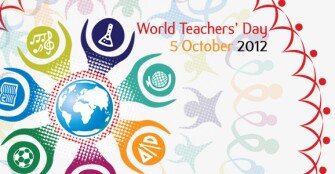On October 5, the United Nations Educational, Scientific, and Cultural Organization’s (UNESCO) hosts World Teachers’ Day in Paris, France, focusing an international spotlight on teaching’s global challenges. International conferences are a commonplace in fields like economics, healthcare and the environment. Experts at these gatherings share several common features: a global sense of urgency, multidisciplinary expertise rooted in a deep knowledge of research, theory, and practice; a body of knowledge and facts that transcend the participants’ differences in language, culture, and context. We have become accustomed to such gatherings as settings for world problem-solving through the gathering of global experts, knowledge, and research.

Now teaching takes the stage as UNESCO asks the provocative question, is teaching a global profession? What would make it one? How do we place the development of the profession higher on the agenda of policymakers and the public? What are the attributes of a true profession, and how do they apply to teaching’s global imperative?
According to the UNESCO Institute of Statistics bulletin Global Demand for Primary Teachers, 114 countries will need to recruit a total of 6.1 million teachers in the next three years. However, numbers alone don’t tell the real story. More and more countries have accepted the simple proposition that economic, social, individual, and civic development all depend on the effectiveness of the world’s systems of public and secondary education, and the quality of the educators who staff them.
In mobilizing to develop a profession equal to the task of meeting these global education challenges, the international community has looked, first and foremost, to establishing a profession through shared knowledge, standards, practice, and values. That is the foundation of every profession, and teaching should not be an exception.
Accordingly, the UNESCO Strategy on Teachers suggests the creation of an International Board of Professional Teaching Standards to assist developing countries define clear standards to guide teacher education. This describes the work of my own organization, the National Board for Professional Teaching Standards. Other countries, such as Australia, have created their own board of teaching standards.
Countries understand that developing standards to articulate a common body of knowledge signifies the first step in creating a true, expertise-driven profession. This body of knowledge serves as a foundation for guiding and implementing all relevant work in the field. Teachers, as expert practitioners in classrooms with students, must lead this development to define what teachers should know and be able to do.
Grounded by a common body of knowledge with teachers leading the field, teachers can begin to approach solving the complex problems they face because they have a common starting place of knowledge and skills, and a common vocabulary for developing, building upon and extending their knowledge base .
Lessons from the United States
UNESCO also emphasizes the importance of improving teacher education institutions so that new teachers are prepared for the demands of the classroom.
Certainly, our own country has examined several initiatives to strengthen teacher education institutions through teacher residencies, more meaningful student teaching, and developing more relevant resources for coursework and field experiences. Yet this work has occurred across a broken front. There is wide variation in the quality and preparation that the nation’s 1400-plus teacher education and alternative route programs offer. The United States needs to commit to higher standards for preparation, programs with strong clinical practice links (or residencies), and a more extended period of induction, in which preparing institutions and employing districts collaborate in supporting novice teachers to hone their knowledge and skills.
To do so may require fundamental changes in how we staff our schools and use educator expertise in preparation. One place to start would be by utilizing the knowledge, skills, and expertise of master teachers directly in the preservice preparation of teachers. Then, continue their involvement in mentoring and teacher development efforts during induction and development towards standards that set a high bar for professional teacher status or tenure.
UNESCO also discusses the importance of improving teacher quality through professional development, increasing teacher motivation, identifying best practices for classroom teaching, and improving teacher evaluation and support.
These efforts mirror our own initiatives in the United States to enhance professional learning, student assessments, and teacher evaluation so that teachers develop their expertise and refine their practice through collaborative and job-embedded professional development. We know that new performance management systems at the district level and evaluation requirements adopted by states are only going to be as strong as the standards they uphold, the quality of evaluators, and most important, the quality of professional development that is available to practitioners.
Once again, master teachers are best suited to serve as stewards of improving teacher quality. Master teachers must be included in peer evaluation, collaboratively helping colleagues improve their practice, to share their knowledge so that all teachers develop a high level of expertise.
Towards a Global Profession
This is how a profession is built- teachers taking the lead to define a common body of knowledge and assuming responsibility for self-regulation, guiding the development towards a true profession capable of solving the great problems. When educators from around the world can transcend the limitations of distance, language, and culture to unite in advancing the knowledge that defines teaching, then ours will truly be a global profession.
I look forward to being part of this international conversation as it seeks to advance the status of teachers by committing to higher standards for teaching and learning and a stronger voice for teachers in the policies and issues shaping their profession. .
Follow NBPTS on Twitter: @NBPTS
Visit the NBPTS Facebook Page